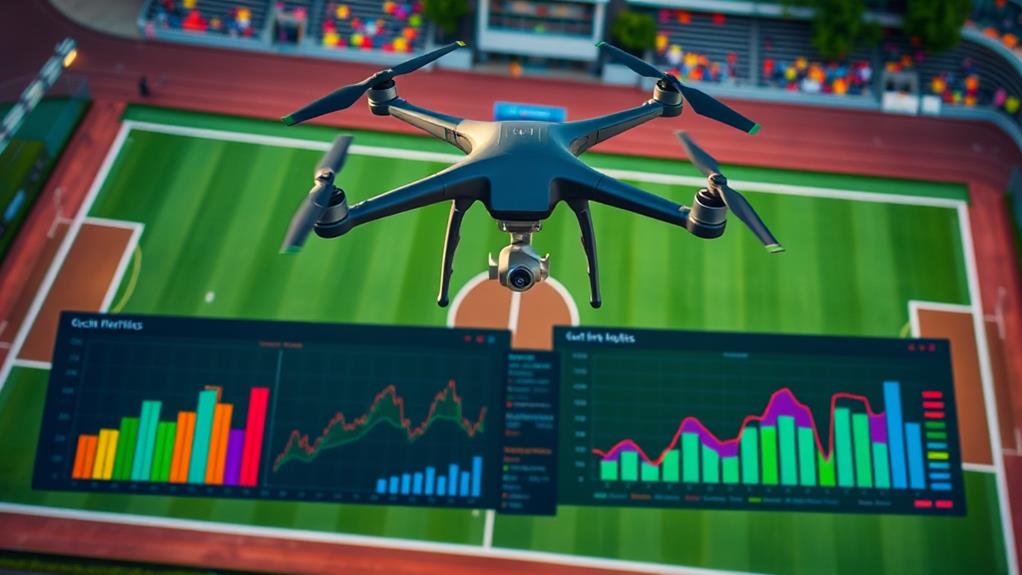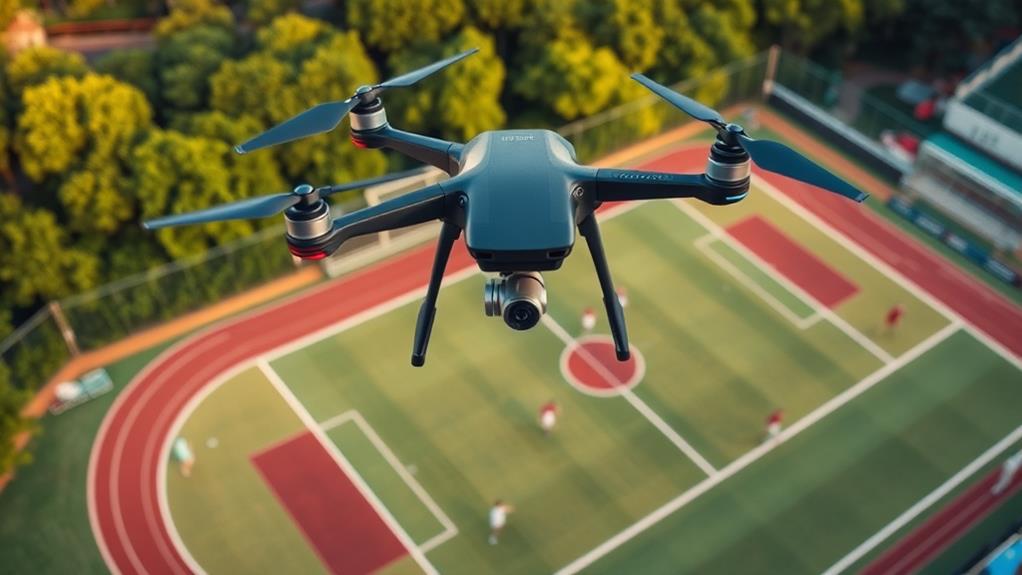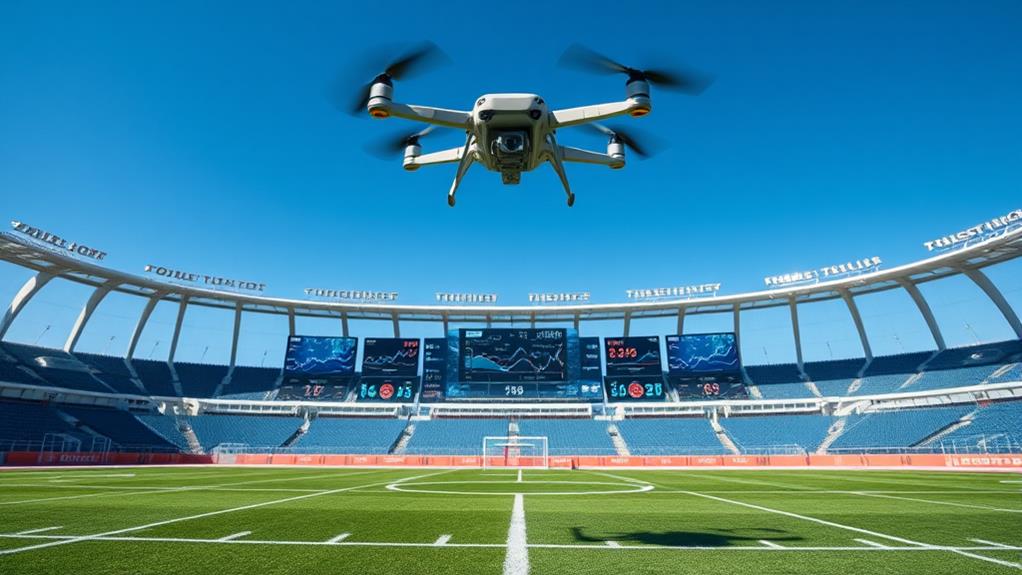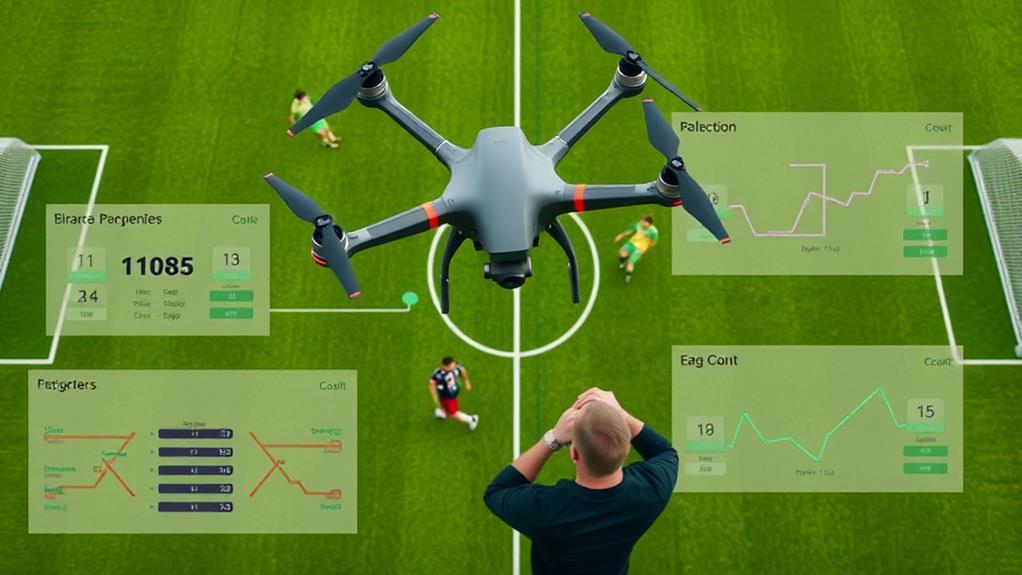Drones are revolutionizing sports coaching by providing unique aerial perspectives for detailed player analysis and performance evaluations. With real-time data, coaches can make quick tactical adjustments based on what drones capture during training sessions. Teams like the Miami Hurricanes and Everton FC utilize this technology to enhance understanding of game dynamics and improve player development. Studies show that implementing drones can lead to up to a 20% increase in team performance. This integration not only refines players' skills but also aids in strategic decision-making, proving essential in modern sports training methodologies. There's much more to explore about this exciting topic.
Benefits of Drone Technology in Coaching

In sports coaching, the integration of drone technology offers a wealth of benefits that can greatly enhance training effectiveness. Drones provide aerial views during training sessions, allowing you as a coach to analyze player positioning and movements in real time. This unique perspective helps you identify areas for improvement and develop strategic plans tailored to your athletes.
Teams like the Miami Hurricanes and Everton FC have already embraced this technology, capturing invaluable tactical insights that inform their coaching decisions. With drone footage, you can conduct detailed performance analysis, offering personalized feedback that hones your athletes' skills and fosters better team dynamics.
Moreover, drones help enhance your understanding of game dynamics by capturing extensive field views. This capability allows you to create tailored training regimens that cater to the specific needs of your athletes, ultimately increasing the effectiveness of training sessions.
As you integrate this cutting-edge technology into your coaching practices, you'll likely notice improved performance outcomes among your athletes. By utilizing drones in your coaching arsenal, you're setting the stage for a more informed, strategic approach to athlete development and teamwork.
Enhancing Performance Analysis With Drones
Using drones for performance analysis transforms how you monitor athletes.
With aerial views, you can gain strategic formation insights and track player movements, providing a broader understanding of the game.
Real-time data integration allows for quick adjustments, making your coaching more effective and enhancing overall performance.
Aerial Performance Monitoring
Drones have revolutionized how coaches monitor player performance by providing aerial perspectives that traditional methods simply can't match. With drones, you can see your training sessions from unique angles, allowing for a deeper analysis of player positioning and movements. This enhanced spatial awareness is essential for understanding team dynamics and improving tactical execution.
Teams like the Miami Hurricanes and Everton FC are already harnessing drone technology to capture detailed footage during sports training. Coaches can then use this footage for personalized feedback, making performance analysis more accurate. Studies show that discrepancies between traditional observation methods and drone-based measurements are only between 2.36% and 2.78%, highlighting the reliability of drone data.
Additionally, drones offer real-time feedback, enabling you to make immediate tactical adjustments during training. This means you can refine athletes' skill sets on the fly, enhancing their game readiness.
As you integrate these advanced coaching techniques into your training regime, you'll likely notice significant improvements in performance and strategy. Drones aren't just tools; they're transforming how you approach sports coaching and athlete development.
Strategic Formation Insights
With the integration of drone technology, coaches can now gain unparalleled insights into player formations during training sessions. Drones provide aerial views that offer a thorough perspective, far superior to ground-based cameras. This unique vantage point enables you to analyze player positioning and team dynamics in a way that was previously impossible.
By capturing footage from above, you can assess how well players execute their roles within various formations, allowing for informed adjustments to strategies based on real-time data.
Using drones in training enhances sports analytics, giving coaches the tools to refine their strategic development. Teams like Everton FC and the Miami Hurricanes have already embraced this technology, leading to improved tactical reviews and overall player performance.
The detailed footage allows for personalized feedback, helping athletes refine their skills and better understand their spatial awareness on the field.
As you incorporate drones into your training routine, you'll notice a marked improvement in how players grasp formations. This understanding is essential for executing game plans effectively, ensuring that your team is always prepared to perform at its best.
With drones, the future of sports coaching is here, and it's transforming how you approach training.
Real-Time Data Integration
Real-time data integration revolutionizes how coaches analyze player performance during training. With drones equipped with sensors, you can gather valuable real-time data on player movements, giving coaches access to detailed performance analytics during training sessions.
This integration allows for enhanced feedback on player positioning, enabling immediate adjustments to coaching strategies and formations.
By utilizing drone technology, coaches can analyze spatial dynamics and player interactions from unique aerial perspectives, which greatly improves tactical understanding.
The real-time data collected can also be compared against historical performance metrics, identifying trends and areas needing improvement in athlete training.
Teams leveraging these innovative tools often report a marked increase in the effectiveness of training sessions.
Some studies even show a 20% improvement in team performance following drone-assisted analysis.
This remarkable advancement not only streamlines coaching methods but also empowers athletes to refine their skills and enhance their game.
Real-Time Feedback for Athletes

Capturing live aerial footage during training sessions revolutionizes how athletes receive feedback. Drones provide real-time feedback that coaches can use to analyze athletes' performance instantly.
With high-resolution video captured from multiple angles, you can visualize your movements and positioning, allowing for immediate adjustments. This technology enhances your awareness of tactical formations, greatly improving your understanding of game strategies.
As a player, you'll benefit from personalized insights tailored to your performance metrics. Coaches can utilize drone footage to break down drills and gameplay, highlighting areas for skill refinement.
This means you won't just be practicing; you'll be learning in real time, making necessary changes on the spot.
Studies show that teams incorporating drones into their training regimens report considerable improvements in athletes' overall performance. The ability to receive instant feedback fosters a more effective coaching environment, empowering you to take charge of your development.
Drones aren't just a trend; they're an essential tool for modern sports coaching. By embracing this technology, you can elevate your game and refine your skills, ensuring you're always on the path to success.
Case Studies of Successful Implementations
The integration of drones into sports training has led to remarkable success stories across various teams. For instance, the Miami Hurricanes have harnessed drones in American football to capture aerial footage that enhances tactical analysis and player positioning assessments. By utilizing drones in sports, they gain insights that traditional methods simply can't provide.
Similarly, Everton FC employs drones to monitor soccer training sessions, allowing coaches to review player movements and formations from unique perspectives. This innovative approach helps in better strategic development.
Meanwhile, the Seattle Sounders utilize drone technology for tactical reviews, capturing real-time footage that aids in refining players' skills and understanding of game dynamics.
A pilot study by Russomanno et al. (2022) further demonstrates the effectiveness of drones, showing a root mean square error of only 0.02 m in tennis, indicating high accuracy in performance tracking. Overall, drones have become a valuable tool in modern training methodologies, greatly enhancing athlete performance through detailed aerial analysis.
As these examples illustrate, the adoption of drones in sports isn't just a trend; it's a game-changer for teams looking to elevate their training strategies.
Future Trends in Drone Usage

As drone technology continues to advance, its role in sports coaching is poised to transform considerably. Future trends indicate that drones will incorporate artificial intelligence to deliver real-time feedback during training sessions. This integration will allow coaches to analyze player performance with remarkable accuracy.
By capturing detailed aerial footage, you'll be able to assess techniques and strategies from multiple angles, enriching your understanding of game dynamics.
Moreover, the use of drones for monitoring player health and biomechanics is expected to expand, providing essential insights into injury prevention. Coaches will have access to data that can help refine recovery protocols, ultimately ensuring athletes remain in peak condition.
Autonomous drones could also revolutionize training by simulating game scenarios through pre-programmed flight patterns. This immersive practice environment will enhance athletes' preparedness.
Ethical Considerations in Sports Drones
As you consider the role of drones in sports coaching, it's vital to think about privacy and surveillance concerns.
Athletes and spectators alike have rights that need protection, and using drones can complicate these ethical boundaries.
Steering through regulatory compliance is essential to guarantee that the benefits of performance analysis don't come at the cost of individuals' privacy.
Privacy and Surveillance Concerns
In today's sports landscape, many fans are thrilled by the prospect of drone footage capturing training sessions and events, yet this excitement brings significant privacy concerns to the forefront. The increased use of drones for coaching raises issues around surveillance, especially regarding athletes' personal lives. A survey revealed that 67% of fans want drone footage, creating a tension between fan engagement and athletes' right to privacy.
Ethical dilemmas arise when drones capture not just athletic performance but also private moments and interactions among athletes. Such footage may not be intended for public viewing, raising questions about consent and privacy rights.
This situation underscores the urgent need for clear regulatory frameworks to guide the use of drones in sports. Sports organizations must establish policies that protect athletes while still allowing the benefits of drone technology in coaching.
Regulatory Compliance Challenges
Maneuvering the regulatory compliance challenges of using drones in sports coaching isn't just about following the rules; it's about understanding the ethical implications that come with this technology. Coaches and trainers must navigate privacy concerns, particularly when recording athletes and spectators without consent.
It's essential to establish thorough policies to protect individual rights, ensuring everyone feels safe during training sessions. Safety regulations play a significant role in drone operations. Adhering to these guidelines helps mitigate risks of accidents or injuries, which is critical for maintaining a safe environment.
Ethical dilemmas also arise, especially when considering whether athletes' performances are exploited for commercial gain without their knowledge or agreement. Additionally, the environmental impact of drone usage shouldn't be overlooked. Coaches and trainers should assess how to minimize ecological footprints while still implementing efficient training methods.
Ultimately, collaboration with regulatory bodies is fundamental to develop a thorough framework governing responsible drone use in sports coaching. This approach will address both operational safety and ethical considerations, ensuring that the integration of drones benefits all involved while respecting their rights and the environment.
Conclusion
In conclusion, drones are changing the game in sports coaching by offering innovative ways to analyze performance and provide real-time feedback. As these technologies continue to evolve, they're not just helping athletes hone their skills but also giving coaches a bird's-eye view of their strategies. By embracing drone technology, you're not just keeping up with the times; you're ahead of the curve, ensuring that your approach to training is as effective and modern as possible.

Leave a Reply